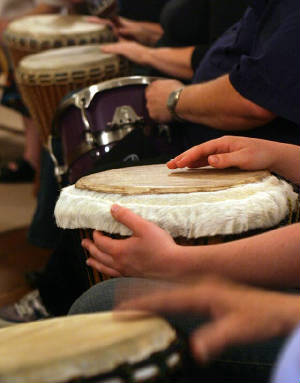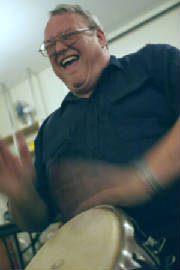|
Man or woman, young or old, inexperienced or expert, it doesn't matter who you are or
where you're from. You're just as important to the group as everyone else.
That's one of the points Rick Cormier conveys about his group, the Different Drummers Drum Circle, based in Yarmouth.
It's a place for interested skin beaters of all ability levels to come and share their love of rhythm and music.
Other instruments such as flutes or the human voice, are also welcome to add flavor to the sounds being created.
For the past year and a half the circle has met in the First Universalist Church on Main Street and its ranks have grown
rapidly.
"I learned about them eight years ago in Massachusetts," Cormier said of drum circles. Having been drumming since the
age of 10, about 40 years ago, and collecting various types of drums from around the world since he was 20, Cormier did not
have to think long when a woman at his church asked if he would be
interested in joining a drum circle there.
"Before long I was being called the unofficial leader of it," he said. "Over the years, it grew in leaps and bounds."
In fact, Cormier noted, they were said to be the second most frequented drum circle in the state.
This was a freestyle drum circle as is the current Maine group. Whereas a facilitated format would place him in the center
of the group, telling people which beats to play and when to begin and end, in freestyle he sits with everyone else, allowing
anyone to begin a beat, with others jumping in when they find a beat to add.
"We're essentially creating a piece of music together as we go," said Cormier. "It's a bit more creative obviously because
they're not being told what to do. The piece
of music we're creating is the focus."
And where does a certain piece of music end, once the group is moving together for about five to fifteen minutes? "The
longer people have been playing together, the tighter the pieces become and the tighter they end," he noted. "People
sort of know 'this would be a great beat to end on.'"
Oftentimes the ending will be followed by laughter, sometimes because one person played past the final beat, but more
frequently because the group is amazed by how well the piece evolved from an impromptu beat to a work of rhythmic art.
Among his 50 to 60 hand drums are djembes and djun djuns from Africa, doumbeks from the Middle East, congas and bongos
and Native American drums.
"People bring whatever drums they have," Cormier said, noting that he always carries about seven or eight extras, which
remain in his car all the time. "My back seat and trunk are full of drums." he chuckled.
"We're very open to novices," added Cormier, quoting one of his favorite slogans: "A drummer is a novice who keeps showing
up."
"The more they drum, the more their skill level comes up," he said.
Cormier says he discourages beginners from buying their first drum right away, recommending that they first sample many
to determine which type best fits them.
The format remains informal, as evidenced by Cormier's saying: "Come when you can and leave when you must."
Between musical rounds, group members mingle and chat, but "they don't go into politics or religion," he said. "People
are taking a break from that stuff."

Rhythmic Reactions
"It's something I can do for myself, and fortunately my family decides to come with me sometimes," said Terri Arden,
who joined the circle in April. "I get confidence
in my ability to create rhythms and to keep those rhythms going."
"The people are great," she added.
Arden mentioned that the circle attended a ground-breaking for a community garden in Portland at the end of June. "There
are opportunities to network with
other people," the Yarmouth woman said.
"Rick's a very good leader," she remarked, recalling his novice slogan. "We sometimes don't know what we're doing and
make a lot of mistakes but it doesn't
matter."
"What's wonderful is that someone starts drumming and you find a way to be in there." noted Rudy Gabrielson, a keyboardist
who has been with the group from the beginning and performs with Cormier in a band called Dad's Night Out.
"Rick is just amazing," he added. "I call him the Johnny Appleseed of drumming."
Gabrielson testifies to the fact that all ages are welcome, noting that he recently brought his 10 and 12 year old children
with him to one session, planning to stay only 45 minutes for their benefit. When the children became involved and found themselves
having a blast, they insisted they stay for the entire two-and-a-half
hours.
"There's a merging of individual expression and being part of a community," Gabrielson said. "By the time you leave you're
feeling pretty great."
"It's something that's been happening for thousands of years," he added. "The connection to that feeling is really good
as well."

The Beat Goes On
Cormier said one of the prerequisites of moving from Massachusetts to Maine was continuing a drum circle in some fashion.
"This was a pretty important part of my
life," he noted. "I'm a psychotherapist for a living and drum circles are my therapy. They're very therapeutic. I wanted
to either find or start one."
Joining the Unitarian church, he offered a workshop similar to one he had devised in Massachusetts, hoping those who
attended would be interested in continuing the activity in regular sessions.
A large group appeared, enthusiasm was high, and the group was established in March 2003. They have since met at 6:30
p.m. twice a month, the first Sunday and
fourth Friday.
Comparing this group to the one in Massachusetts, Cormier noted, "People up here tend to be more receptive to it partly
because the education level is higher and people in Maine tend to be open to alternative therapies and practices. More couples
and families are involved with it. People are very family oriented in southern Maine."
At first an average of 10 would show up, a number that has expanded to 25 during the winter months when attendance is
highest. People come from Damariscotta to Wells. To be included on the mailing list, which includes more than 100 people,
write Cormier at: differentdrummers@yahoo.com
Other instruments are always welcome. Cormier's wife, Judy, who attends often, will sometimes bring a flute to play along
with the beats. Other instruments range
from the Aboriginal didgeridoo or the South American berimbau to the mandolin.
Cormier also continues to teach Intro to Drum Circles workshops a few times a year. His second four-class seminar through
Yarmouth Community Services will begin Wednesday, Sept. 29.
"My aim is to just get people comfortable and confident drumming," he said.
And Cormier always encourages those who enjoy the workshop to come and drum at the church with other enthusiastic
rhythm makers and do it for free.
"This is obviously something I have a passion for," he noted. "I love the work I do in these drum circles. I really do."
|